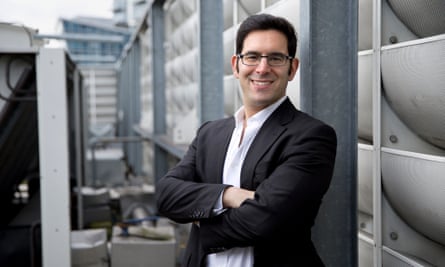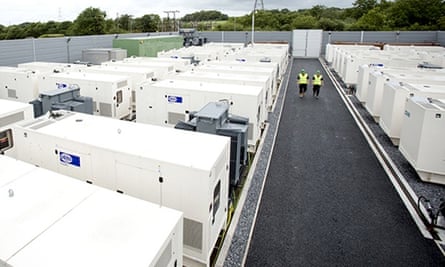Subsidies levied on household energy bills have helped drive a boom in polluting “diesel farms” across the UK to meet periods of peak electricity demand, the Guardian has found.
Almost a quarter of Britain’s back-up power under one programme for the National Grid is being provided by tiny fossil fuel power stations – some of which have been built on farmland by entrepreneurs.
The mini-power stations are brought into play by grid managers when there is a rapid surge in demand for power, for example when large numbers are watching major sporting events such as the World Cup or Wimbledon finals or during major TV events such as the final of Strictly Come Dancing.
In the coming weeks the grid is to offer through auction a new set of subsidies to diesel farms under a scheme designed as insurance against the lights going out.
Neither the Department of Energy and Climate Change, the grid nor many of the companies involved are keen to provide much information about this shadowy new industry.
Many environmentalists, industrialists and politicians admit they have been largely unaware of the trend but say they run totally counter to the Department of Energy and Climate Change’s (Decc) attempts to reduce C02 levels. Burning diesel also produces particulates and nitrogen dioxide which are responsible for at least 29,000 premature deaths a year – mostly from traffic fumes.
KiWi Power, an energy technology company specialising in demand reduction, argues the grid’s new transitional arrangements should be restricted to low carbon solutions and the diesel farm boom halted.
“We feel that it would be extremely unfortunate and not in the country’s interests if this subsidy were instead spent on polluting diesel farms, rather than encouraging true innovation,” said Yoav Zingher, a co-founder of KiWi.
The grid accepts that 22% of its short-term operating reserve (Stor) programme is already met by diesel generation but is unwilling to provide detailed information about which companies offer what capacity.

The privately-owned grid that balances energy supply and demand, claims to publish all the information it can about diesel on its website and argues that it cannot discriminate against fossil fuels.
“As with our approach to operating the (power) system on a national level, National Grid has to be generation neutral,” said a spokesman. “Stor contracts [for shot-term extra power] are awarded based on capability and price, and we cannot discriminate against fuel types offered.”
Decc confirmed that diesel generators of under 50 mega watts (MW) could bid for subsidised contracts under the transitional arrangements – a part of a wider “capacity market” scheme.
A spokesman declined to explain why one of the most carbon heavy fossil fuel capacity was being encouraged saying Decc was in “purdah” due to the general election campaign.
The need for demand response to meet peaks in power has become more acute because old coal and nuclear power stations have been retired and fewer than expected new gas-fired generation built.
Tim Yeo MP, the outgoing chairman of the House of Commons select committee on energy and climate change, described the diesel farm boom as “ridiculous” and campaigned for more to be done on demand reduction.

Tom Greatrex, the shadow energy minister, said earlier rounds of the capacity market had already rewarded mini fossil fuel power stations: “It was clear from the outset that the capacity market risked locking in a new generation of dirty diesel generators that were too small to be affected by carbon policies. Sure enough, 40MW of small diesel generators have now secured 15-year subsidies.”
Alasdair Cameron, energy campaigner at Friends of the Earth, was also critical: “Renewables will certainly be the main source of energy in the future. It’s vital that we design a clean back-up system that works with them, based around energy storage and the smart use of electricity,” he said.
Obtaining information about the diesel farms is difficult with one operator privately claiming that it would not provide detailed information on where its plants were located for “security reasons.”
Green Frog Power, Abbey Powergen and UK Power Reserve are among the few firms which have been willing to confirm that they have taken advantage of contracts through Stor under which they can be paid for diesel plant generation even when it is not used.
Green Frog was originally established to collect cooking oil which could be turned into biofuels for generating electricity but later since switched to using traditional fossil fuels to make power.
Backed by a former part of HSBC bank known as InfraRed Capital Partners, Green Frog has built 214MW of diesel generation including a 52-generator site producing 20MW of power at Neath in south Wales, a similarly sized one in Swansea and others in Hull and Plymouth.
Mark Jones, a Green Frog director, admitted the carbon intensive diesel equipment was expensive to run but insisted it was built only to respond to occasional moments of peak demand.
“Plants run for short periods quite infrequently, less than 50 hours a year on average. They are designed to start and get to full output very fast and can do so in 45 seconds if needs be. Gas plant cannot respond so fast for technical reasons.”

The Green Frog website says it is building “modular fast-start” power stations throughout the United Kingdom. It says: “We have sites located from Newcastle-upon-Tyne in the North through to Plymouth in the south. All of our first-phase sites have approved electrical export connection agreements and approved detailed planning and environmental permits.”
Jones said the company had now stopped building any more diesel farms and had now moved onto cleaner gas-fired plants. “We intend to become the leading supplier of balancing services to the system and we intend to do that in as clean and efficient manner as practically possible. We hope that ... legislation does serve to close down the diesel plant that our competitors seem hell bent on building.”
Meanwhile, UK Power Reserve has three diesel generators at Asfordby in Melton Mowbray, Trumfleet in Doncaster, and Wakefield but says they are different from small-scale diesel farms. “These are big industrial ones and not designed to sit empty. The majority of the [UK Power Reserve] plants are gas-fired,” according to a spokeswoman.
Tim Emrich, the chief executive of UK Power Reserve in an interview with trade newsletter New Power said other firms “are using small diesel generation behind the scenes for ... Stor,” adding that “the diesel farm mentality is flawed.”
Abbey Power Solutions, an arm of a larger property development group, has constructed 50MW of diesel generation on sites near Sheffield and Barnsley in Yorkshire plus Spalding in Lincolnshire.
The company confirmed it was involved in Stor but was not willing to talk about its operations.

Comments (…)
Sign in or create your Guardian account to join the discussion